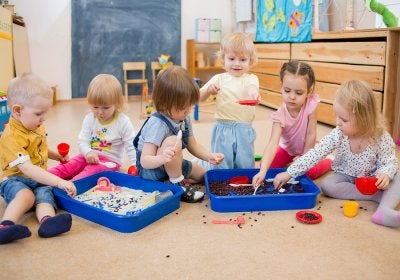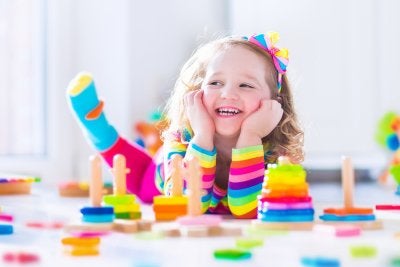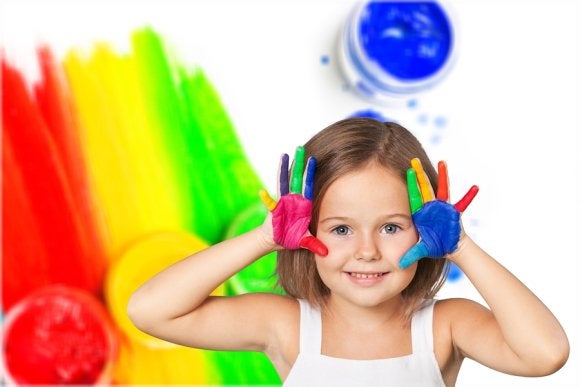-
Developmental Milestones in Four-Year-Olds
Four is an exciting year for parents and children alike. Four-year-olds are eagerly embracing their newfound independence and they are actively developing the skills they will need in kindergarten and beyond. You’ll begin to see your child take on a more clearly defined personality as he or she progresses through pre-kindergarten . Consider talking to your child’s pre-k teacher in Pembroke Pines about ways of supporting your child’s healthy development at home.
Motor Skills
 Pre-k kids are working on both gross and fine motor skills. In fact, parents are often amazed at the boundless energy of their four-year-olds. A four-year-old should generally be able to balance briefly on one foot, hop on one foot, and walk up the stairs without assistance. As pre-k kids progress toward their fifth birthdays, they begin to try new skills like somersaulting, climbing, swinging, and skipping. Fine motor skills become much more developed during this year. Your child should be able to print some letters, use cutlery, copy geometric patterns, and get dressed and undressed without assistance.
Pre-k kids are working on both gross and fine motor skills. In fact, parents are often amazed at the boundless energy of their four-year-olds. A four-year-old should generally be able to balance briefly on one foot, hop on one foot, and walk up the stairs without assistance. As pre-k kids progress toward their fifth birthdays, they begin to try new skills like somersaulting, climbing, swinging, and skipping. Fine motor skills become much more developed during this year. Your child should be able to print some letters, use cutlery, copy geometric patterns, and get dressed and undressed without assistance.Language Use
You might notice that your four-year-old eagerly looks forward to story time. He or she may even begin recalling parts of a story on his or her own. During this year, he or she should begin speaking sentences longer than five words, use the future tense, and clearly speak his or her name and address.
Cognitive Development
Pre-kindergarten programs guide children in learning the essential skills they’ll need later on, including pre-math skills. During this year, your child should be able to name at least four colors and he or she should have a general understanding of the passage of time. Your child should be able to count 10 or more objects.
Socio-Emotional Development
One major benefit of high-quality pre-k programs is the social skills that kids acquire. Your child will enjoy spending time with friends. He or she will adjust to the idea of cooperative and group play. Your child may be very interested in fantasy play, but in many cases he or she will know how to distinguish reality from fantasy.
-
Cultivating Empathy in Your Young Child
When your child is between the ages of three and four, he or she can enjoy preschool activities at a learning center in Pembroke Pines. Socializing with other preschool students will help your child develop empathy, but there are also steps you can take at home to cultivate empathy in your young child. Empathy is crucial for your child’s lifelong emotional stability and ability to work well with other people. The empathetic child is capable of distinguishing his or her feelings from those of others, understanding the perspective of others, and regulating his or her own emotional response.
Help your child identify his or her emotions.
 Preschool students are still working on learning how to identify their emotions and communicate their feelings. Sometimes, falling short in these areas can prompt a child to experience behavioral meltdowns. Label emotions whenever possible. For example, you could tell your child, “Thank you for the hug. That was so kind of you,” “I like how you shared your train with your baby sister. It’s made her so happy!” or “It must have made you sad to lose your teddy bear. Let’s see if we can find it together.”
Preschool students are still working on learning how to identify their emotions and communicate their feelings. Sometimes, falling short in these areas can prompt a child to experience behavioral meltdowns. Label emotions whenever possible. For example, you could tell your child, “Thank you for the hug. That was so kind of you,” “I like how you shared your train with your baby sister. It’s made her so happy!” or “It must have made you sad to lose your teddy bear. Let’s see if we can find it together.”Encourage the open sharing of feelings.
Young children need to know that their parents are actively listening to them and acknowledging their feelings. Make eye contact and listen carefully when your child speaks to you. Respond with joy when your child shares his or her happy feelings or with sadness when your child is upset. Share your own feelings with your child to help him or her understand that everyone has emotions and that part of life involves learning how to cope with them.
Assign responsibilities to your child at home.
Early childhood development research suggests that children who have small responsibilities at home generally become individuals who are caring and empathetic. Simple tasks like feeding the dog or helping you fold laundry will teach your child the value of helping others. Similarly, it will help your child to better appreciate when other people do nice things for him or her.
-
Highlighting Pre-Academic Skills Learned in Preschool
Giving your child the experience of preschool will help as he progresses to pre-kindergarten and into grade school. Various preschool activities can form the building blocks of early academic skills and child development in Pembroke Pines. Through these fun and engaging activities, your child will gain new experiences that will follow him throughout his academic career.
Preschool classes are typically filled with laughter and playtime. However, that same playtime is teaching children the basic foundational concepts associated with reading, writing, science, and math. A child might see his coloring page as a fun craft, but his preschool teacher knows that he is learning fine motor skills to help with future writing worksheets. The class may enjoy digging in the dirt to plant seeds, but their teacher knows that she is teaching them a simple concept of earth science. These are just a few examples of the various skills and life lessons your child will learn with a preschool curriculum. If you are curious to learn more, contact a preschool near you to schedule a campus visit.

-
Helping Your Child Learn How to Grip a Pencil
As your child enters preschool near Pembroke Pines, he may struggle with the concept of gripping a pencil. This is normal, especially in early childhood education . Children are still developing their fine motor skills and learning how writing on paper will help their academic success.
Watch the short video for an easy way to help your child grip a pencil. You would hand your child a pencil, sharpened end toward him. Ask him to grip the pencil between his thumb and pointer finger. As he grips, slowly move the pencil to rest on the skin webbing between these two digits.
Be sure to watch your child as he does his preschool or kindergarten work. Notice if he grips the pencil too hard. If he has blisters on his hands or his knuckles are white while writing, ask him to loosen his grip. This will help encourage him to hold the pencil correctly.
RECENT POSTS
categories
- Uncategorized
- Early Learning Center
- Pre-K
- Children
- Child Care Center
- Preschooler
- Preschool Blog Category | Tanglewood Academy
- Preschool Lunch
- Tanglewood Academy
- After-School Program
- Toddler School
- Early Childhood Education
- preschool activities
- pre-kindergarten
- childhood education
- pre-kindergarten programs
- Children’s education
- enrichment opportunities
- Kindergarten
- Nurturing Education Environment
- Toddler Care
- Child Separation Anxiety
- Toddlers
- Summer camp
- summer activities
- VPK
- Voluntary Pre-K
- Outdoor Activities
- Smart Strategies
- Tie Shoes
- Snacks
- Physical Activities
- Education
- Enrichment Activities for Kids
- Early Education Activities
- Preschool Curriculum
- Classroom Learning
- APPLE accreditation
- Language Comprehension
